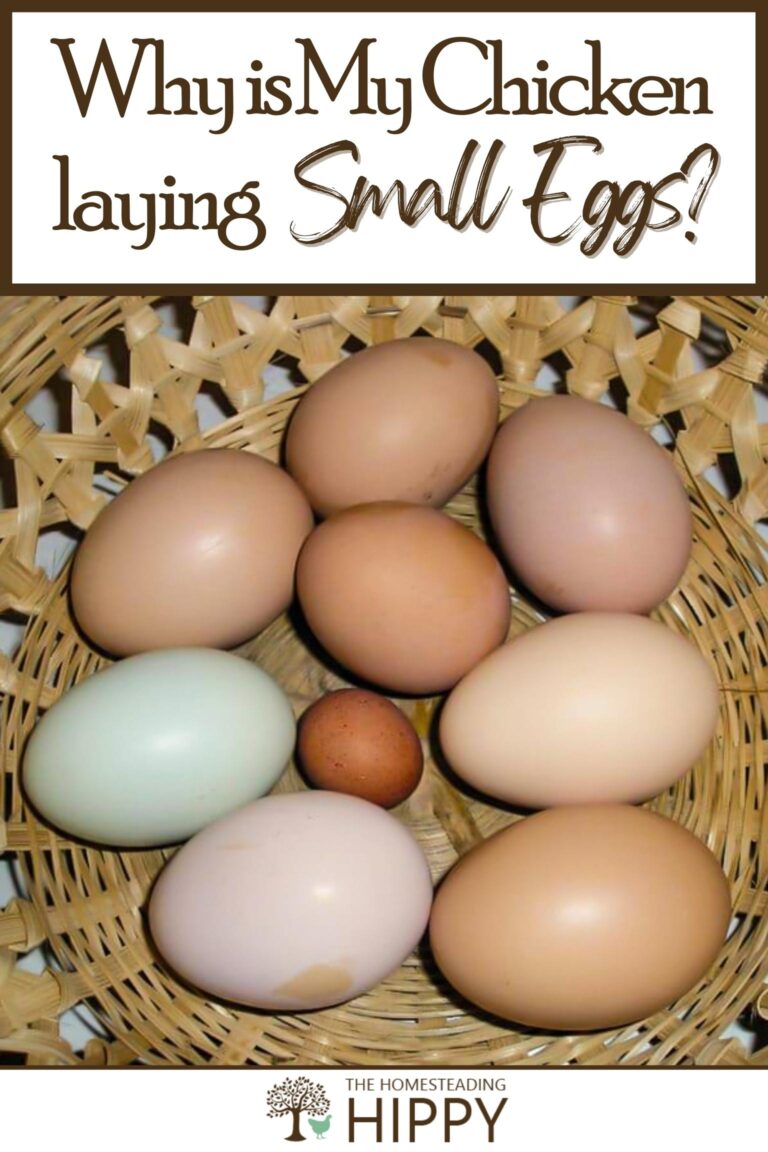Chickens laying small eggs can be concerning for chicken owners, as this often indicates that something is wrong with their chicken’s health. This article will discuss the reasons why chickens lay small eggs and what can be done to improve the chicken’s health, nutrition and overall husbandry. We will look at the environmental factors that can influence egg size and egg production and how to provide the best possible conditions for chickens to lay larger eggs.
Causes of Chickens Laying Small Eggs

Age of the Chicken
Chickens lay larger eggs when they are younger and lay smaller eggs when they are older. Why are my chicken eggs so small? The answer could be that your chicken is getting older. As chickens age, they tend to lay fewer and smaller eggs.
Diet
Chickens that are not receiving proper nutrition may not lay eggs at all or will lay smaller eggs. A balanced diet of grains, vegetables, and protein is important for laying healthy eggs. If the chicken is not receiving enough of any of these components in their diet, it could lead to smaller eggs being laid.
Stress
Just like humans, chickens can become stressed from life changes. When a chicken is stressed, it can cause them to lay smaller eggs, making them lay fewer eggs overall.
Disease
Sometimes a chicken will experience a disease or infection that can cause them to lay smaller eggs. Diseases like Marek’s Disease, coccidiosis, and mycotoxins can all lead to chickens laying small eggs.
Breeding and Genetics
Sometimes the size of an egg is determined by the breed or genetic line of the chicken. Some chickens may lay smaller eggs naturally due to their breed, which is out of their control.
Ways to Improve Egg Size
Proper Diet
Providing a balanced, nutrient-rich diet is essential for chickens laying small eggs to ensure they are receiving the vitamins and minerals they need to produce optimal egg size. A diet rich in calcium and protein, with limited carbohydrates, can help to ensure the chickens are receiving the nutrients they need. Additionally, pay attention to the quality of the feed, as poor-quality feed can reduce egg size.
Minimizing Stress
Stress can also have an effect on the size of eggs laid, so it is important to keep chickens in a comfortable and safe environment. Providing adequate space, free from predators and with access to clean water and food, is essential for a stress-free environment. Additionally, it is important to keep the noise level low around the chickens and to provide plenty of areas for them to hide.
Vaccinating for Disease Prevention
Providing chickens with regular vaccinations can also help improve egg size by keeping them healthy and preventing the spread of disease. Vaccines can help prevent common illnesses, such as Marek’s Disease, which can weaken chickens and cause them to lay small eggs.
Know Your Breed
The breed of chicken can also have an effect on egg size. Some breeds, such as the Rhode Island Red, are known for producing large eggs, while others, such as Leghorns, lay small eggs. Knowing the breed of chicken can help to determine whether or not the chickens are producing eggs of an appropriate size.
Frequently Asked Questions
What are the most common causes for chickens to lay small eggs?
Age: Hens that are younger or older tend to lay smaller eggs.
Nutrition: Poor nutrition can lead to small eggs.
Stress: Stress can affect egg size, so ensuring a peaceful environment is essential.
Lighting: Too much or too little light can affect a hen’s egg size.
Breed: Some breeds of chickens tend to lay smaller eggs.
What can I do to ensure my chickens lay larger eggs?
Provide chickens with a balanced diet, including a high-quality layer feed and a variety of fresh foods such as fruits, vegetables and mealworms. Ensure that the feed is fresh and not contaminated with mold or bacteria. Provide adequate clean water and grit to aid digestion. Regularly clean the coop and provide comfortable nesting boxes with plenty of bedding materials. Monitor the health of the birds and provide appropriate vaccinations. Minimize stress by providing plenty of space and a calm environment. Regularly check for parasites and treat accordingly.
Are there any dietary changes I should make to encourage larger eggs?
Yes. A few simple dietary changes can help encourage larger eggs:
- Provide a balanced, nutrient-rich chicken feed.
- Include plenty of calcium in the feed. Calcium is essential for strong eggshells.
- Add protein-rich foods such as mealworms and cooked eggs to the diet.
- Provide a continuous supply of fresh, clean water.
- Offer a variety of green vegetables and fruit.
- Supplement the diet with an eggshell supplement such as oyster shell grit.
Is there a certain age when chickens begin to lay smaller eggs?
Yes, chickens typically start to lay smaller eggs as they age due to the depletion of their egg-producing hormones. This process usually begins when the hen is around one year old, and the eggs will gradually decrease in size as the bird ages. It is important to note that this age-related change in egg size is normal and should not be a cause for concern.
Are there any environmental factors that can affect the size of a chicken’s eggs?
Yes. Chickens are sensitive creatures, and their environment can have a major impact on their egg size. Here are some of the environmental factors that can affect the size of a chicken’s eggs:
- Nutrient Deficiencies: If a chicken is not getting enough essential vitamins and minerals in their diet, it can lead to small eggs.
- Weather: Extreme temperature fluctuations can cause the chicken to produce smaller eggs.
- Light: Chickens that are exposed to long hours of light can produce smaller eggs.
- Age: Older chickens tend to lay smaller eggs than younger chickens.
- Stress: A stressed chicken can produce smaller eggs.
- Breed: Certain breeds of chickens tend to lay smaller eggs than others.
By understanding the environmental factors that can affect a chicken’s egg size, you can make sure to provide your chickens with the right conditions to ensure they lay healthy eggs.
Conclusion
The primary cause of a decrease in egg size is the age of the chicken, however there are other contributing factors such as the diet, environment, and health of the chicken. By understanding these factors, chicken owners can ensure their chickens are healthy and producing the best eggs possible.
